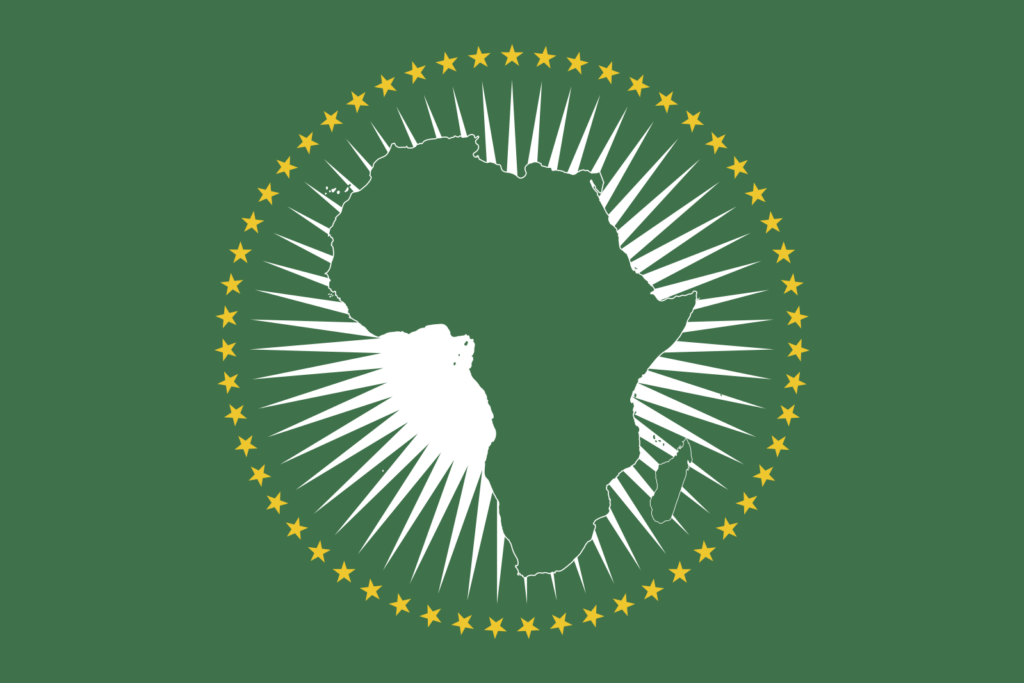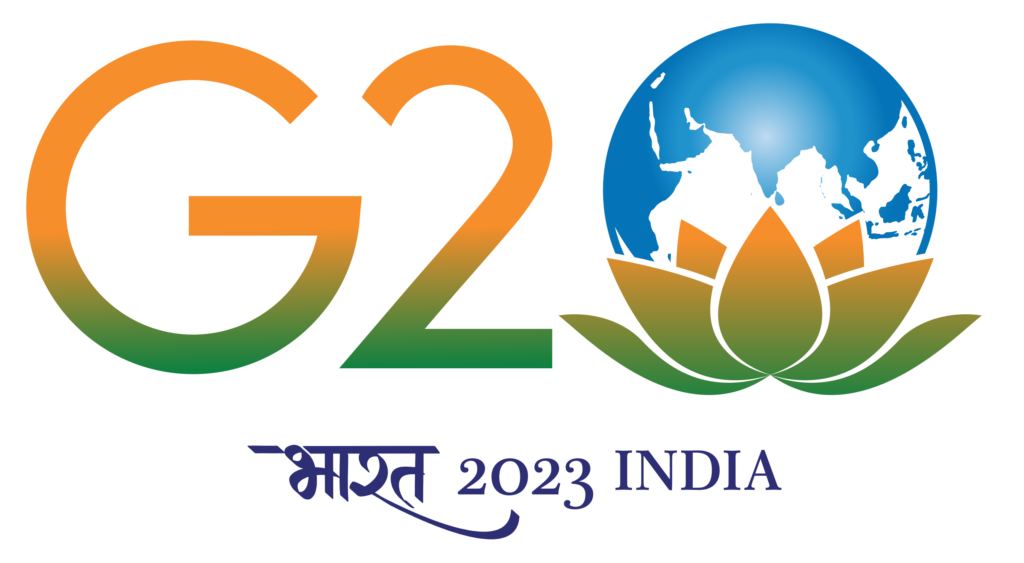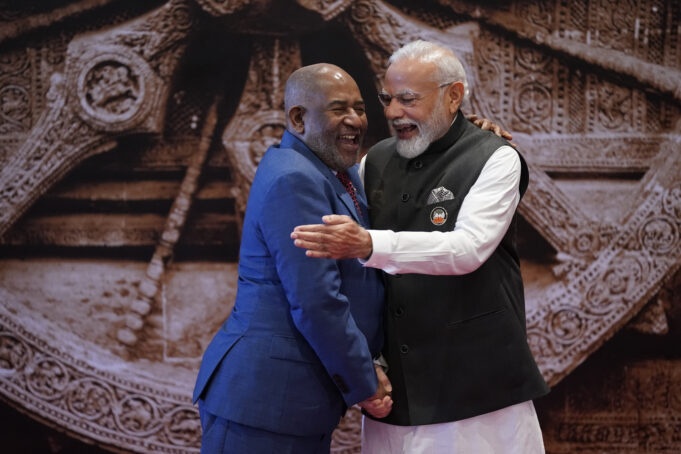The Group of 20 leading industrial and developing nations concluded their annual summit of leaders in New Delhi, India, recently, under the theme: “One Earth, One Family, One Future.”
World leaders held talks on issues ranging from climate change and green growth to gender equality and countering terrorism. Among major outcomes in the closing G-20 New Delhi Leaders’ Declaration was the admittance of the African Union (AU) as a permanent member. The body now is the Group of 21.
“We welcome the African Union as a permanent member of the G20 and strongly believe that inclusion of the African Union into the G20 will significantly contribute to addressing the global challenges of our time,” read the declaration.
India’s Prime Minister Narendra Modi concluded his Sept. 9 opening remarks by inviting President Azali Assoumani of Comoros, who serves as the AU chairman, forward to receive a flag, a country nameplate, and a seat at the table. The 55-nation AU joins the European Union, and 19 nations: The United States, South Africa, Argentina, Australia, Brazil, Britain, Canada, China, France, Germany, India, Indonesia, Italy, Japan, Mexico, Russia, Saudi Arabia, South Korea, and Türkiye.

Previously, South Africa, a founding member of the G-20, was the only African nation represented. But with changing times and growing demands by African leaders for a louder and more valued voice on the global landscape, analysts and observers are considering what the move indicates.
“Whenever our people, Black, Original, oppressed people around the world are being integrated into an established order, we should be optimistic, but sober,” said Cedric Muhammad, member of the AU’s Congress of African Economists and of the Nation of Islam Research Team.
“Two phrases from the Honorable Minister Louis Farrakhan came to mind relative to this,” he added. “One is ‘politics without economics is symbol without substance,’ and the other, ‘He who gives you the diameter of your knowledge, prescribes the circumference of your activity,’” said Mr. Muhammad.
The researcher-economist noted there is powerful and positive symbolism in the elevation of Africa by a leader from Asia, referring to Prime Minister Modi, who strongly advocated for the move. However, he told The Final Call, with U.S. President Joe Biden also supporting the membership—perhaps for different reasons—the move necessitates careful scrutiny.
“So as we were cautioned—Black people in America—about integration being a hypocritical trick in this country,” referring to warnings of Minister Farrakhan and the Most Honorable Elijah Muhammad of The Nation of Islam, “there is of course, (the) same principle at work,” Cedric Muhammad stated, about the AU-G-20 alliance.
“Why now? What’s the motive? And what are the pragmatic, operational aspects of the integration? And do they lead to a revolutionary … liberating … empowering result?” he said, are questions that must be examined.
In addition, other questions like: Are the African nations being integrated with no authority and autonomy? Does this hinder or propel harmony, cooperation, collaboration and unity between Africa, Asia and the Americas—the nonaligned nations of the Global South?
Considering a sordid past with Africa and a current power scramble for its resources, is this a “last ditch effort in public relations by the Western nations” that fear losing unfettered control of resources and minerals they need from Asia, the Americas and Africa, particularly at a time when globalization is under pressure? The decision comes amidst a declining Western world and unprecedented realignments among Global South nations.

“So if the world is delinking, and becoming more fragmented, it’s in the interest of those who have benefited from colonialism, imperialism in the Transatlantic Slave Trade, to integrate us perhaps into a burning house,” reasoned Mr. Muhammad, referencing analytical words of Dr. Martin Luther King Jr.
Other analysts see possible benefits in the new AU status but also acknowledge a possible sinister “illusion of inclusion” move driven by the changing times and global powershifts.
“We are in some incredibly turbulent times,” said political analyst Dr. Wilmer Leon, citing the nature and current frenzied pace of global swings.
He pointed out examples such as the expansion of the BRICS (Brazil, Russia, India, China, and South Africa) bloc of nations. Similarly, the rising influence of China and Russia is a counterbalance to U.S. domination, imperialism, and European neocolonialism.
Dr. Leon sees the move as a good opportunity for the AU currently, because African countries are joining the international economic order from a stronger position now compared to the recent past.
“The African Union can join the G-20 from a much greater position of strength,” said Mr. Leon.
He told The Final Call that the response by African people in the wake of recent coups in Niger, Gabon, Burkina Faso, and Mali highlights a changing mentality among Africans. Besides popular support for change, there was strong anti-West disdain, aimed particularly at America and France. Likewise, other African nations threatening to invade their brother Africans over the coups were severely rejected.
Furthermore, African nations are increasingly locking arms with other powers like China, Russia, Turkey, Iran, India, and Japan, and Gulf nations like Saudi Arabia, Qatar, and the United Arab Emirates.
Another sign of a new day was African leaders presenting a 10-point peace plan in June, to end the Russia-Ukraine war, and pushing back against the U.S.-led agenda to isolate Russia.
“They’re not just acquiescing anymore to American dictates,” said Mr. Leon.
A few years ago, African leaders would have done it blindly, simply because America told them to. “That is telling me that there’s a different mindset developing, and I underscore the word developing,” he said. Because “this thing is dynamic. It is not static; it is incredibly dynamic,” said Mr. Leon.
The AU is taking the position with a different mindset in an ever-changing world and the slow crumble of the West. It remains to be seen what the AU will actually do with the new status.
“Africa cannot properly unite under the auspices of the G-20, or with the G-20 nations if itself is not united,” added Cedric Muhammad.
Seeing it through historical lenses that documented the exploitative relationship of the U.S. and Europe with Asia, Africa, the Caribbean, Central and South America, he doubts the G-20 is the space to gain greater control and reverse the effects of what they suffered.
Cooperation, harmony, collaboration and unity have to take place outside of the control of the Western nations that have dominated these countries, Mr. Muhammad explained.
“If there’s not a parallel track, where separately, these countries can work on political, economic, cultural issues that divide them from one another and within their own borders, then this is more of an absorption, than empowerment.”
The AU represents a rising continent whose young population of 1.3 billion is set to double by 2050 and make up a quarter of the planet’s people.
Supporters of the move say with full G-20 membership, the AU can represent a continent that’s home to the world’s largest free trade area with a collective GDP of $3 trillion. The G-20 represents around 85 percent of global GDP and 75 percent of global trade, as well as two-thirds of the world’s population, prior to the AU joining. African leaders spent seven years requesting a seat in the G-20.
“This is a “reflection of Africa’s growing influence and importance on the global stage,” said Stéphane Dujarric, spokesperson for UN Secretary-General António Guterres, in a statement.
“When much of the existing international multilateral architecture was built, most of Africa was still colonized and did not have an opportunity to have their voices heard,” he said. “This is another step towards correcting that imbalance,” he added.
But underlying concerns about the pact’s realness and the persistent screams for African acceptance, begs consideration of past cautionary words to Africa from Minister Farrakhan.
The Minister and his teacher, the Most Honorable Elijah Muhammad, the Eternal Leader of the Nation of Islam, addressed the plight of Africa and taught that unity will solve 95 percent of our problems.
In various addresses Minister Farrakhan advocated for a United States of Africa and warned against others doing for Africa, what Africa can do for itself as a resource rich continent.
“Everything you need is right under your foot. But you’re looking everywhere else for help instead of to yourself and what you can produce for yourself. This is Africa’s dilemma,” said Minister Farrakhan while visiting the continent on his second World Friendship Tour in 1996. “You are parading yourself before the world as international beggars when you gave civilization to the world,” he said.
His remarks ring true today about the underpinning issue plaguing African leadership: continental disunity. “Your problem is not America … Israel … Britain. Your problem is your disunity and your dependence on others to do for you what you could do for yourself,” said Minister Farrakhan.













